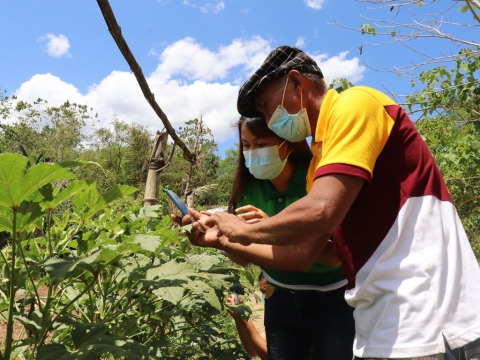A farmer-youth tandem completes the hands-on activity on smartphone familiarization under the DFP training conducted by ATI Region 2. (photo by ATI Region 2)
Having completed the introductory course and assessment activities on digital literacy, some 800 farmers and youth members are set to upskill on precision agriculture through the Digital Farmers Program (DFP) 102 to be rolled out August this year.
This is the second course in the three-level program of the Agricultural Training Institute (ATI) and Smart Communications Inc., which aims to build a pool of digitally adept farmers, along with agriculturally involved youth members nationwide.
DFP 102 centers on in-depth agriculture applications and the utilization of social media and smartphones for farming efficiency and improved productivity. After this course, participants should be able to identify and use agri-related applications of both government and private organizations; as well as social media platforms that will enhance their practices. Moreover, they are expected to develop skills in e-commerce and learn how to manage online marketing transactions for their products through Facebook and PayMaya, among other platforms available.
Specifically, it features SPIDTECH, an android application aiming to help its users identify, manage, report, and monitor major insect pests and diseases of rice, corn, coffee, cacao, banana, and coconut in the Philippines. This app was developed by Smarter Approaches to Reinvigorate Agriculture as an Industry in the Philippines (Project SARAI), funded by the Department of Science and Technology – Philippine Council on Agriculture, Aquatic and Natural Resources Research and Development.
Some special features of SPIDTECH include the use of machine learning technology to identify pests and diseases of SARAI-focus crops using mobile phone cameras; and a virtual encyclopedia containing data on identification signs, life stages, management practices, and other pertinent information on different plant pests and diseases.
Another application covered in the DFP 102 course is the Plant Doctor Online, developed by East-West Seed Philippines. This app is made to provide breeders, researchers, field technicians, and farmers access to a tool that will enable them to potentially identify plant diseases. It also showcases a collection of vegetable disease management guides.
Familiarization on some information, communication, and education resources and tools developed by the Philippine Rice Research Institute (PhilRice) is, likewise, offered in the course. These, among others, are the Pinoy Rice Knowledge Bank, Rice Doctor, Rice Crop Manager, Binhing Palay, e-Damuhan, MOET app, AgRiDOC app and PhilRice Text Center.
DFP 102 was piloted in ATI Regions 1, 6, and 13 in June and early July.
Meanwhile, the national training or trainers (TOT) for this course was conducted via Zoom last July 21-23. Some information services staff of the ATI’s network of training centers, and Smart local teams, who are serving as primary facilitators of the ladderized program, participated in the training.
The activity served as an avenue for them to fully grasp the principles and ideas encapsulated in the training course, particularly, the learning design, toolkit contents, evaluation tools, templates, resources, and activities. Similarly, a rapid ideation for DFP 103 was carried out.
Prior to this TOT, a Design Thinking Workshop was conducted with Limitless Lab, earlier in March, to develop and package the DFP 102 toolkit for the facilitators and participants.

